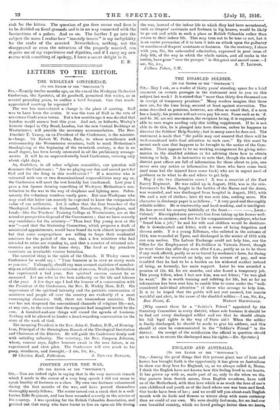LETTERS TO THE EDITOR.
THE WESLEYAN CONFERE.NCE. [To THE .EDITOR OP YHE " SPECTITOR.".] Sie,—Exactly twelve months ago, on the eve.of the Wesleyan Methodist , Conference, the ,Spectator, of its ,goodwill, -permitted this writer, as in several preceding years, to outline a brief forecast. Can that much- appreciated courtesy be repeated ?
The war has necessitated a change in the plate of meeting. Hull
was to have been the centre. It was the turn of Hull in the rota of -teventeen Conference towns. But a few months ago it was decided-that Leaden would answer best this year. And not, as hitherto, Wesley's historic chapel in City Road, London, but the new Central Buildings at Westminster, will provide the necessary -accommodation. The Rev.
Dinsdale T. Young, an ex-President of the Conference, is the minister- in-charge. Sir Robert W. Perks, Bart., to whose munificence and statesmanship the Westminster structure, built to mark Methodism's thanksgiving at the beginning of the twentieth century, is due in no mall degree, has been keenly interested in All -the preliminary arrange- - nients. It will. be an unprecedentedly brief Conference, covering only about eight days.
As, doubtless, in all other religious assemblies, one question will dominate the Conference : " Are we playing our due and sacred part for 'God and for the King in this world-crisis ? " If a minister who is entrusted with one or two denominational responsibilities may say so, the Conference will meet the -test humbly but unashamed. Last year I gave a few figures -showing something of Wesleyan Methodism's con- tribution to the -war in the way of chaplains _and fighting men. Subse- quently the voluntary numbers vastly. grew. But non-Wesleyan who may read this letter can scarcely be expected to know the comparative value of our arithmetic. Let it suffice that the four branches of the Theological Institution—at Richmond, Manchester, Birmingham, and 'Leeds—like the Teachers' Training College at Westminster, are at the • actual or prospective disposal of the Government ; that we have scarcely ' any candidates for the ministry—" Thou last Thy young men at the "war "—and that the Stationing Committee, which prepares a draft of ministerial appointments, would have -found its task almost insuperable but that some congregations are willing to forgo their residential ministers for the period of the war, that a few ministers who had intended to retire are standing in, and that a number of returned mis- tionaries are -available for home duty. The local or lay preachers constitute an invaluable reserve battalion.
The essential thing is the spirit of the -Church. If Wesley came to Conference he would say : " Your business is to save as ninny souls , as you can." Unhappily, should any man account statistics of member- , ship an infallible and exclusive-criterion of success, Wesleyan Methodism has experienced a bad year. But spiritual success cannot be so measured. 'Let me refer to the best authority on the life and labours of the year. A few days ago I had the honour of a conversation with ' the President of the Conference, the Rev. R. Waddy Moss, D.D. His impressions of the spiritual intensity and the patriotic consecration of ministers and people all over the country are evidently of a most encouraging character. Still, there are tremendous anxieties. The war has not deepened the conventional channels of religious life—not, at any rate, to the extent that the sanguine had imagined would be the rase. A hundred-and.one things will crowd the agenda of business. Nothing will be allowed to hinder a heart-searching conversation on the state of the work of God.
The incoming President is the Rev. John G. Tasker, D.D., of Birming- ham, Principal of the Birmingham Branch of the Theological Institution and Chairman of the District. He will guide the Conference firmly and with unfailing urbanity. The secretary, the Rev. Simpson Johnson, whom, rumour says, higher honours await in the near future, is an: experienced and alert pilot. The Conference will owe much to his grasp, steadiness, and foresight.—I am, Sir, &e.,






























 Previous page
Previous page